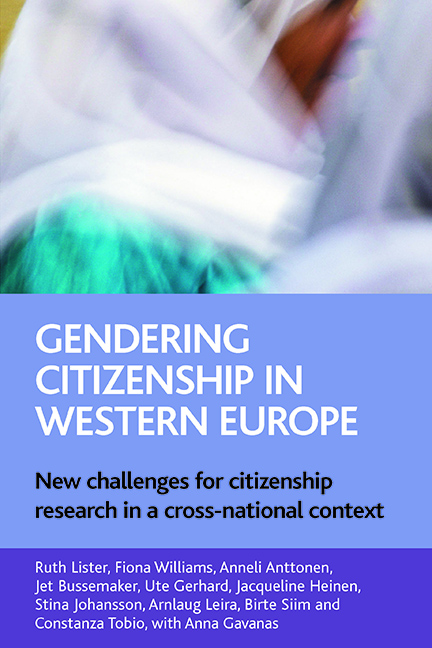 Gendering Citizenship in Western Europe
Gendering Citizenship in Western Europe four - Gendered citizenship: the care of young children
Published online by Cambridge University Press: 15 September 2022
Summary
Introduction
Since the 1990s, Western Europe has experienced a remarkable shift in political thinking about childcare. A profound politicisation of the relationship between the state and the family has generated renegotiations of the boundaries between public and private responsibilities in the care of young children. Parenting norms, parental responsibilities and relations are changing rapidly in many regions, while families and households are no longer expected to take full responsibility for the care of their children under school age. Policies aimed at reconciling paid work and childcare are accelerating these processes. With a special interest in the transformation of childcare – from private to shared collective responsibility and, in some welfare states, to a social right – this chapter takes as its starting point those policy shifts which are redefining access to various forms of childcare services and benefits as a social right of parents and children.
Within the European Union (EU) there is political agreement that childcare policies are essential in reducing gender inequalities and in changing the gendered nature of social and economic citizenship. This is most clearly evident in the Parental Leave Directive of 1996, the Recommendation on Childcare of 1992 and the targets set for the provision of childcare services at the European Council meeting in Barcelona in 2002. In fact, legislation and policy recommendations have redefined the young child's need for care as a responsibility of both the state and parents. Childcare policy reform has broadened the platform from which parents are entitled to make claims on the welfare state. The elaboration of public policies for the early childhood years is affecting the institutional arrangement between welfare states, families and labour markets, while childcare-related policies have added to the social and economic rights of mothers and fathers (Leira, 2002).
The transformation of childcare policies in Western Europe stands in stark contrast to the policy reforms since the early 1990s in those Central and Eastern European welfare states known in the 1970s and 1980s for their massive public investments in provisions for preschoolers (see Kamerman and Kahn, 1978, 1991; UNICEF, 1999; Heinen and Portet, 2004). Since the 1990s, the dramatic decline in the public provision of childcare services and benefits has meant a shrinking of the childcare-related social and economic rights of parents. The following analysis of national policy reforms covers Denmark, Finland, France, Germany, the Netherlands, Norway, Spain, Sweden and the UK.
- Type
- Chapter
- Information
- Gendering Citizenship in Western EuropeNew Challenges for Citizenship Research in a Cross-National Context, pp. 109 - 136Publisher: Bristol University PressPrint publication year: 2007


